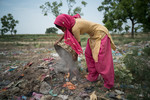New report outlines how conflict leads to increased violence against women
It calls on UK to use its aid budget to boost women’s rights in Afghanistan
Report coincides with Christian Aid charity’s Christmas appeal on women in Afghanistan and India.
The current peace deal being brokered between the Taliban and the US risks setting women’s rights and security back many years by not making assurances to protect women’s employment, education and participation in government, Christian Aid is warning. The NGO is calling on the UK government to use its aid budget and diplomatic influence to ensure that women’s rights defenders are supported in Afghanistan.
In a new report to coincide with the charity’s Christmas appeal, which focuses on Afghanistan and India, Christian Aid stresses that global gender inequality is exacerbated by the prevalence of all forms of violence against women and girls (VAWG), including forced abortions, rape, female genital mutilation and femicide.
The report, War on Women: The global toll of conflict and violence, explains that although violence exists in every society around the world, poor and marginalised women are particularly vulnerable to violence, and it is exacerbated during times of conflict.
The publication outlines how women in Afghanistan, particularly those living in extreme poverty, still experience high levels of violence and highlights Afghan women’s concerns that any peace deal which does not proactively protect their rights is unacceptable and could further jeopardise their safety.
In addition, the report calls on the UK to help ensure that women are given platforms to make their voices heard in Afghanistan and internationally; and asks it to invest in organisations and interventions that have a proven track record of protecting women and girls from gender-based violence, as well as building a just and inclusive peace.
 Amanda Khozi Mukwashi, CEO of Christian Aid, said:
Amanda Khozi Mukwashi, CEO of Christian Aid, said:
“The stark fact is that violence against women and girls is increased in conflict settings such as Afghanistan.
“There and around the world, the eradication of gender-based violence (GBV) is a major and urgent challenge of our time; there is a growing recognition that violence against women cannot be tackled unless the systemic inequalities which keep women vulnerable are also recognised and work is done to reduce those inequalities.
“While we commend the work that has been done in increasing gender parity since the end of World War Two when Christian Aid was founded, we are convinced that more must be done. All governments committed to equality and justice must no longer tinker around the edges in tackling the effects of violence against women, but must focus their energies on addressing the structural issues of discrimination and economic inequality for the sake of all the world’s women.”
In countries where UN-backed policies to address violence against women and girls are not fully implemented, Christian Aid is calling for progressive, transparent and accountable tax and fiscal policies to ensure public money is available and spent effectively on their implementation, as well as on gender-sensitive public services and infrastructure that reduce women’s risk of violence and widen their economic opportunities.
In particular, the NGO says that:
All governments should include women in determining the roadmap for the implementation of CEDAW.
Governments should give renewed emphasis to the implementation of the CEDAW for women and girls everywhere.
The UK Government should ensure the Department for International Development reviews and benchmarks its spend across the breadth of the CEDAW convention and aims to monitor and improve progress across the board.
The report states: “Violence against women and girls increases in conflict settings, with the poorest and most marginalised women and girls suffering the most. We believe less military conflict will lead to less violence perpetrated against women…An overly militarised response is more likely to result in war.”
Christian Aid calls on the UK government in particular to:
Prioritise structural or longer-term approaches to preventing armed conflict that address the underlying causes of war and violence. It should aim to bring about a reduction in the potential for armed or political violence over time and promote non-violent means to address acute need and rights entitlements.
Champion the meaningful inclusion of women in peacebuilding initiatives around the world.
Ensure that its spending on peacebuilding is transparent, accountable and used to restrain rather than reinforce armed actors. It should ensure that increases in UK diplomatic capacity include prioritising skills in conflict analysis and mediation.
Make efforts to address structural inequality and violence, respect international law and human security, and engage in demilitarisation, disarmament and reduction in spending on armaments.
Spend more on peacebuilding. It should do this with funding mechanisms that not only clearly state their objectives and how they will contribute to reducing violence and conflict, but also how they will build peace.
The report adds that: “The UK should also reflect on its own experience of conflict and military intervention and incorporate lessons from this – good and bad – into a clear policy.”
In India, the report points out that gender inequality is inextricably bound up with caste discrimination and other forms of social exclusion, which increase the likelihood that women and girls will face poverty and be subjected to violence.
DraggedImage.b0496b5191e441f090627409d72e6eb0.png
DraggedImage.a7948e91242748d895289bff1cf2f6de.png



